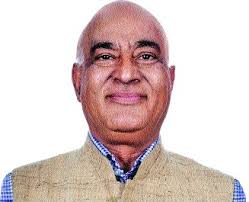Synchronised elections, voter behaviour, and governance outcomes
An active policy proposal of the Government of India is to hold national elections at the same time as the assembly elections of all the states. This article examines whether holding national and stat...
-
 Vimal Balasubramaniam
Vimal Balasubramaniam  Sabyasachi Das
Sabyasachi Das  Apurav Yash Bhatiya
Apurav Yash Bhatiya  28 August, 2020
28 August, 2020
- Articles
Political determinants of newspaper markets in India
Newspapers are an important source of political information for Indian voters. This article looks at how political factors influence the newspaper market. Using the announcement of delimitation in the...
-
 Julia Cagé
Julia Cagé  Guilhem Cassan
Guilhem Cassan  Francesca R. Jensenius
Francesca R. Jensenius  23 November, 2023
23 November, 2023
- Articles
A proposal for public funding of elections and political parties in India
The Finance Minister of India recently introduced measures aimed at cleaning up political party funding in the country. In this article, Gowda and Santhosh highlight the limitations of these measures,...
-
 M.V. Rajeev Gowda
M.V. Rajeev Gowda  Varun Santhosh
Varun Santhosh  21 April, 2017
21 April, 2017
- Perspectives
Can MNREGA buffer negative shocks in early childhood?
Exposure to negative shocks such as drought during early childhood is known to have lasting, detrimental effects on human development outcomes. This column examines whether a household’s access to ...
-
 Aparajita Dasgupta
Aparajita Dasgupta  29 August, 2014
29 August, 2014
- Articles
Left, right, and toilets
Eliminating open defecation in India is a policy priority. This column contends that successful strategies for reducing open defecation may not fit policy stereotypes of the left or the right. While ...
-
 Dean Spears
Dean Spears  19 August, 2014
19 August, 2014
- Articles
What the Muslim mortality paradox reveals about importance of sanitation for all children in India
It has long been noted that in India, Hindu children face substantially higher mortality rates than Muslim children, despite being relatively richer on average. This column shows that differences in ...
-
 Michael Geruso
Michael Geruso  18 August, 2014
18 August, 2014
- Articles
Culture, religion and open defecation in rural north India
Open defecation in rural India is a human development emergency that is causing infant deaths, child stunting, and widespread infectious diseases. This column presents surprising qualitative and quan...
-
 Diane Coffey
Diane Coffey  14 August, 2014
14 August, 2014
- Articles
Colonial Origins of Restrictions on Land Transfer in India
Lack of access to credit is often argued to be an important determinant of poverty. This lack is often traced back to the poor not having collateral. This absence of collateral in turn has been linked...
-
 Anand Swamy
Anand Swamy  31 July, 2014
31 July, 2014
- IGC Research on India
The challenge of fulfilling aspirations
This year’s election is a watershed in Indian history. This editorial discusses possible reasons for the stunning defeat of the previous government. While there is no denying that the previous gove...
-
 Ashok Kotwal
Ashok Kotwal  15 July, 2014
15 July, 2014
- Perspectives
Andhra Pradesh's youth training and employment scheme: Did it work?
To promote youth employment, the state government of Andhra Pradesh launched an innovative public-private partnership programme for skill development, training and job placement for the youth. This n...
-
 Rajendra Kondepati
Rajendra Kondepati  07 July, 2014
07 July, 2014
- Notes from the Field
Political clientelism in MNREGA: Evidence from West Bengal
The problem of political clientelism becomes imminent in decentralised systems where certain individuals or groups associated with the political party locally in power, get preferential access to sca...
-
 Upasak Das
Upasak Das  25 June, 2014
25 June, 2014
- Articles
Emerging challenges: Economic and social
To mark the second anniversary of I4I in July 2014, we invited two eminent scholars – Abhijit Banerjee (MIT) and Mukul Kesavan (Jamia Milia) to discuss the emerging economic and social challenges in...
-
 Abhijit Banerjee
Abhijit Banerjee  Mukul Kesavan
Mukul Kesavan  Ashok Kotwal
Ashok Kotwal  06 June, 2014
06 June, 2014
- Videos
Do women in power have an impact on corruption?
The recently elected 16th Lok Sabha of India will have a record number of 61 women parliamentarians. This column assesses whether women in the labour force or positions of power can have an impact on...
-
 Chandan Kumar Jha
Chandan Kumar Jha  Sudipta Sarangi
Sudipta Sarangi  21 May, 2014
21 May, 2014
- Articles
What voters reward: Evidence from the 2009 Indian parliamentary elections
Do voters care about economic outcomes? This column analyses the 2009 parliamentary elections in India and finds that voters favoured parties that delivered high growth in their states and rejected t...
-
 Poonam Gupta
Poonam Gupta  Arvind Panagariya
Arvind Panagariya  12 May, 2014
12 May, 2014
- Articles
Can workfare programmes moderate violence?
It is widely known that income shocks may trigger spurts of violence. This column explores whether workfare programmes can help mitigate support for violent movements. It finds that MNREGA has had a ...
-
 Thiemo Fetzer
Thiemo Fetzer  05 May, 2014
05 May, 2014
- Articles
Twitter feed
Tweets by Ideas4IndiaMost Popular Governance Posts
Unique Health Identification and Aadhaar: A case for mandatory linkage
As part of the Digital India initiative, All India Institute of Medical Sciences (AIIMS) issues a Unique Health Identification (UHID) number to each patient, which documents their entire journey in th...
 Mudit Kapoor
Mudit Kapoor  23 December, 2016
23 December, 2016
- Perspectives
Caste dominance in rural India: Cause and effect
Rural India remains a caste-based society. This column explores why caste continues to play such an important role and what the effects are. It argues that trade and agricultural productivity suffer, ...
 Siwan Anderson
Siwan Anderson  16 August, 2012
16 August, 2012
- Articles
Why did the Indian economy stagnate under the colonial rule?
How did the Indian economy fare under the colonial rule? Is the average Indian significantly better off after Independence? This column examines trends in GDP per capita in order to determine the stan...
 Aniruddha Bagchi
Aniruddha Bagchi  16 September, 2013
16 September, 2013
- Articles





 16 November, 2023
16 November, 2023






